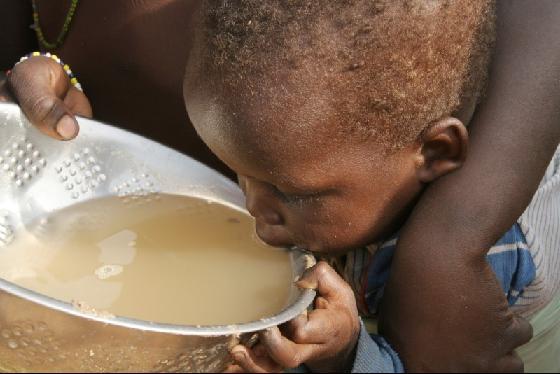 |
| Person drinking contaminated water |
More than 3.4 million people in this world die every
year from issues relating to water, sanitation, and hygiene. Of these 3.4
million people, 99% of them occur in the developing world. According to the
United Nations, unclean water kills more people than war combined with all
other forms of violence. Because water sustains life, it is life’s most basic
need, yet many people in the world are unable to have access to this necessity.
 |
| Child drinking unclean water |
Many parts of a person are affected by unclean water.
Unclean water can cause children to be unable to attend school and parents to
be unable to maintain a job. Drinking water gives humans energy to perform
their daily functions. If a person gets sick from drinking contaminated water,
they are unable to go about their daily tasks. Children are unable to go to
school, and parents are unable to work for money. Most of all, drinking unclean
water can cause numerous health problems and diseases. According to Water
Projects International, 80% of all disease in the world originated from unclean
water, poor sanitation, or bad hygiene. Water and sanitation directly links to
the health of each and every person. Drinking unclean can cause a person to get
Typhoid fever, also called Salmonella Typhi. Typhoid fever can cause birth
defects, cancer, and generic damage. From drinking polluted water you can also
get Cholera. Cholera affects a person’s intestines. Without immediate medical
treatment, a person affect by Cholera could die within 12 hours. A person can
also get Trachoma from drinking unclean water. Trachoma irritates the eyes and can
cause blindness. Unclean water can also cause a person to get amoebic dysentery.
It is an intestine infection that causes severe diarrhea. Schistosomiasis is a
disease that is caused by parasitic worms. A person gets infected when their
skin comes in contact with contaminated freshwater, where harmful snails live.
Crops need clean water to grow. Without clean water for irrigation, crops die,
providing families with little to no food to consume.
 |
| Children gathering water from a local stream |
The UN estimates that Sub-Saharan Africa spends 40
billion hours a year gathering water. That wastes a lot of time. A jerry can,
the typical container used to gather water in Africa, weighs over 40 pounds
when it is completely full. Children have to walk many miles to an unclean
water source to collect water, when instead, they could be going to school.
Malalatiana Rosoanisina from Madagascar said, “Twice a I’d have to collect
water, it gave me stomach ache as the water was yellow. I couldn't go to school
and had to go to the doctor.” Malalatiana would often get sick from drinking
dirty water and would have to skip school. Additionally, Malalatiana had to
collect water from an unsafe spring. The path leading to that spring was
dangerous and slippery. She often fell over and lost water. As a result, she
was forced to return to the spring to collect more water for her family. Shilpi
Mondal from Bangladesh told the organization WaterAid about her situation, “We collect water
from 20-30 km away, usually about once every ten days. We share a boat with our
neighbors as we can’t afford our own. This water gives us diarrhea – we know it
does – but what else can we do – we have no choice. When I give the water to my
daughter I know it will make her ill. It makes me very sad.”
 |
| African children using LifeStraws, a portable water filter |
 |
| Clean water |
Many organizations are helping out with this global
issue. Such organizations include Water.org, Water Projects International, Blue
Planet Network, and Concern Worldwide. These organizations work together with
the affected countries to build wells and other water structures. It
significantly improves access to water for people, therefore, saving time.
WaterisLife.com provides areas with unclean water with water filters, a water
filter system for households, and clean water wells. Many organizations are
doing their best to tackle this global issue as effectively as they can.
However, they can always use help from you!
Ending poverty begins with clean water. Unclean water
causes poor health, hunger, and a lack of education. These three things lead to
a cycle of poverty.
Deuteronomy 15:11 - There will always be poor people in the land. Therefore I command you to be openhanded toward your fellow Israelites who are poor and needy in your land.
Sites Used:
No comments:
Post a Comment